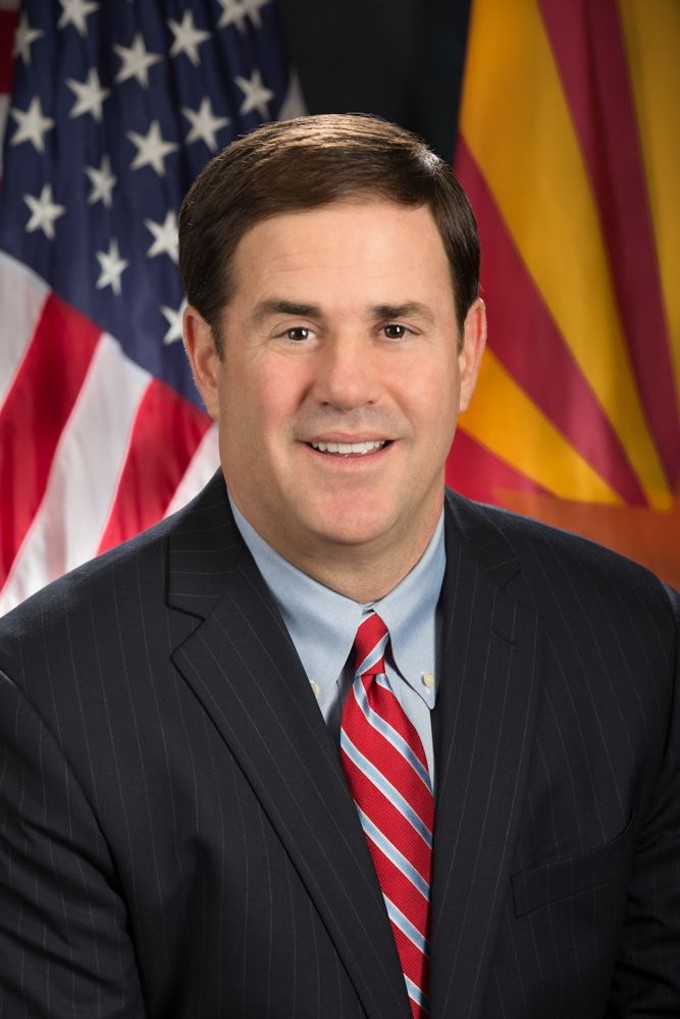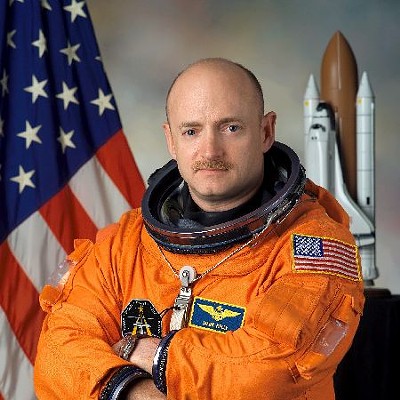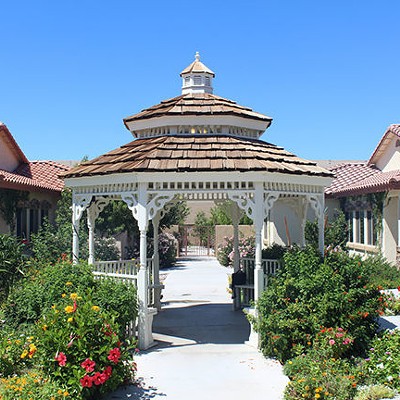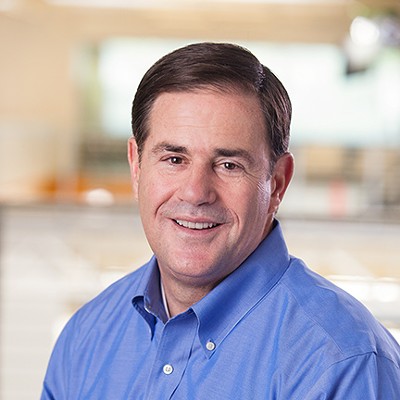Tuesday, January 14, 2020
Ducey Promises More Ed Funding, Highway Work in State of the State Address
Today Arizona Governor Doug Ducey gave his sixth State of the State address in Tucson, highlighting priorities for the new year, including funds for education, job training and broadband connectivity, closure of the state’s largest and oldest prison, and calling out Tucson’s failed sanctuary city initiative.
Dozens of tables filled up at the Tucson Convention Center to watch Ducey deliver the speech, which was also given yesterday at the state capitol in Phoenix, kicking off the second half of the 54th legislative session.
“Ladies and gentlemen, I’m proud to report: the state of our state is strong. And the best part is, it’s only getting better,” Ducey told the audience. “Look at all that’s happening around us. Our crime rate is dropping, and school test scores are rising. Our credit rating is up, and our debt is way down. Household incomes have hit a record high, and our poverty rate has dropped faster than any other state in the nation.”
After highlighting advancements in the local economy and Arizona’s growing population, the governor turned to his biggest line item, funding K-12 public education. After the Red for Ed movement pressured the state to restore recession-era funding cuts in 2018, Ducey promised public school teachers a 20 percent raise by this year.
His 2020 budget includes the final 5 percent of that promise, in addition to a full restoration “district additional assistance” which can be used flexibly throughout school districts for things like textbooks, staff raises, curriculum updates, building improvements and more.
Ducey also included $15 million in additional funding for the Arizona Teachers Academy, which partners with the state’s public universities and community colleges to provide educational training on all levels. The tuition and fees are waived if graduates of the program commit to work at an Arizona public school.
“This year, we intend to build on our momentum with reforms allowing even more students to go through the Academy,” Ducey said. “Students are seeking degrees in math and science, teachers specializing in educating blind children. Arizona’s future depends on these educators. Let’s provide them with access so they can get to the front of the classroom—debt free.”
Another education initiative is “Project Rocket” for struggling schools. Ducey says this will provide additional funding and access to “proven strategies” to help improve outcomes at low-performing public schools. Schools rated “D” or “F” by the Arizona Department of Education may opt into the three-year pilot program to receive grants aimed at helping them close the achievement gap.
For higher education, Ducey’s “New Economy Initiative,” will provide funding to the state’s three public universities (University of Arizona, Arizona State University and Northern Arizona
University) to “boost post-secondary attainment and increase the number of graduates in critical high-demand industries.”
As part of that plan, ASU will design and launch a new center for engineering education and research, UA will hone in on personalized medicine and “cutting edge healthcare delivery models,” while NAU will work to prepare students for working in the healthcare industry, specifically in mental and behavioral health fields.
Ducey announced the commitment of $28 million for an acceleration of expanding Interstate 10 between Tucson and Phoenix. The money would go toward a new six-lane bridge over the Gila River. Ducey said 62,000 people drive over the 56-year-old bridge every day, equalling 23 million drivers a year.
“The Phoenix-Tucson corridor is an economic artery for our state and it needs expanding,” Ducey said. “It’s time to accelerate completion of I-10’s widening, in both directions, between our two largest cities.”
Another $50 million in Ducey’s budget proposal will go toward installing 500 miles of broadband conduit and fiber optic cable along Arizona highways. These “Smart Highway Corridors” will be located on Interstate 17 between Sunset Point and Flagstaff, Interstate 40 between borders with California and New Mexico and Interstate 19 between Tucson and Nogales.
A major development within Ducey’s address is his commitment to close the Florence state prison. This facility is Arizona’s oldest, and currently houses over 3,800 incarcerated men.
As part of the transition, existing staff from the Florence prison will be relocated to the Eyman prison, less than three miles away. The Governor’s Office says additional staff will allow the Eyman complex to be fully staffed, eliminating vacancies and “providing inmates with better access to programs and other services, such as enhanced second chance programs.”
No correctional employees will lose their jobs as a result of the move. The office estimates this will save taxpayers $247 million over three years.
“We’ve provided more opportunities and we’ve decreased the amount of people returning to prison and helped many find meaningful work,” Ducey said.
Ducey also wants to expand Second Chance Centers, which provide necessary resources for incarcerated individuals to more easily transition back into society. They help with job readiness, enrollment in health care, transportation services and more.
On this note, Ducey also announced a decision to change the name of the Department of Corrections to the Department of Corrections, Rehabilitation and Reentry, in order to “better reflect its mission.”
The governor took the opportunity to recognize that the Tucson Families Free and Together ballot initiative from last year, which aimed to create a sanctuary city, was soundly rejected by over 70 percent of local voters. He wants a state-wide ban on sanctuary cities to pass in the legislature this year.
“If anyone needed a reminder, here in Arizona, we respect the rule of law. Last fall the voters of Tucson demonstrated that loud and clear,” Ducey said. “And now it’s time for all Arizonans to make their voices heard, and enshrine it in our Constitution. This November, let’s give all Arizona voters the opportunity to say ‘yes’ to the rule of law and ‘no’ to sanctuary cities.”
Other key priorities listed by the governor include:
• Additional funding for the Department of Child Safety
• An elimination of all state income taxes for veterans’ military pensions
• A suicide prevention action plan
• An executive order requiring three regulations to be eliminated for every one created
• Funding the purchase of 1,267 body cameras for every Arizona State Trooper
• A rural jobs initiative providing funds for training programs at community college aligned
with industry needs
More specific dollar amounts for these initiatives and more will be announced during the roll out of Ducey’s executive budget proposal later this month.
Dozens of tables filled up at the Tucson Convention Center to watch Ducey deliver the speech, which was also given yesterday at the state capitol in Phoenix, kicking off the second half of the 54th legislative session.
“Ladies and gentlemen, I’m proud to report: the state of our state is strong. And the best part is, it’s only getting better,” Ducey told the audience. “Look at all that’s happening around us. Our crime rate is dropping, and school test scores are rising. Our credit rating is up, and our debt is way down. Household incomes have hit a record high, and our poverty rate has dropped faster than any other state in the nation.”
After highlighting advancements in the local economy and Arizona’s growing population, the governor turned to his biggest line item, funding K-12 public education. After the Red for Ed movement pressured the state to restore recession-era funding cuts in 2018, Ducey promised public school teachers a 20 percent raise by this year.
His 2020 budget includes the final 5 percent of that promise, in addition to a full restoration “district additional assistance” which can be used flexibly throughout school districts for things like textbooks, staff raises, curriculum updates, building improvements and more.
Ducey also included $15 million in additional funding for the Arizona Teachers Academy, which partners with the state’s public universities and community colleges to provide educational training on all levels. The tuition and fees are waived if graduates of the program commit to work at an Arizona public school.
“This year, we intend to build on our momentum with reforms allowing even more students to go through the Academy,” Ducey said. “Students are seeking degrees in math and science, teachers specializing in educating blind children. Arizona’s future depends on these educators. Let’s provide them with access so they can get to the front of the classroom—debt free.”
Another education initiative is “Project Rocket” for struggling schools. Ducey says this will provide additional funding and access to “proven strategies” to help improve outcomes at low-performing public schools. Schools rated “D” or “F” by the Arizona Department of Education may opt into the three-year pilot program to receive grants aimed at helping them close the achievement gap.
For higher education, Ducey’s “New Economy Initiative,” will provide funding to the state’s three public universities (University of Arizona, Arizona State University and Northern Arizona
University) to “boost post-secondary attainment and increase the number of graduates in critical high-demand industries.”
As part of that plan, ASU will design and launch a new center for engineering education and research, UA will hone in on personalized medicine and “cutting edge healthcare delivery models,” while NAU will work to prepare students for working in the healthcare industry, specifically in mental and behavioral health fields.
Ducey announced the commitment of $28 million for an acceleration of expanding Interstate 10 between Tucson and Phoenix. The money would go toward a new six-lane bridge over the Gila River. Ducey said 62,000 people drive over the 56-year-old bridge every day, equalling 23 million drivers a year.
“The Phoenix-Tucson corridor is an economic artery for our state and it needs expanding,” Ducey said. “It’s time to accelerate completion of I-10’s widening, in both directions, between our two largest cities.”
Another $50 million in Ducey’s budget proposal will go toward installing 500 miles of broadband conduit and fiber optic cable along Arizona highways. These “Smart Highway Corridors” will be located on Interstate 17 between Sunset Point and Flagstaff, Interstate 40 between borders with California and New Mexico and Interstate 19 between Tucson and Nogales.
A major development within Ducey’s address is his commitment to close the Florence state prison. This facility is Arizona’s oldest, and currently houses over 3,800 incarcerated men.
As part of the transition, existing staff from the Florence prison will be relocated to the Eyman prison, less than three miles away. The Governor’s Office says additional staff will allow the Eyman complex to be fully staffed, eliminating vacancies and “providing inmates with better access to programs and other services, such as enhanced second chance programs.”
No correctional employees will lose their jobs as a result of the move. The office estimates this will save taxpayers $247 million over three years.
“We’ve provided more opportunities and we’ve decreased the amount of people returning to prison and helped many find meaningful work,” Ducey said.
Ducey also wants to expand Second Chance Centers, which provide necessary resources for incarcerated individuals to more easily transition back into society. They help with job readiness, enrollment in health care, transportation services and more.
On this note, Ducey also announced a decision to change the name of the Department of Corrections to the Department of Corrections, Rehabilitation and Reentry, in order to “better reflect its mission.”
The governor took the opportunity to recognize that the Tucson Families Free and Together ballot initiative from last year, which aimed to create a sanctuary city, was soundly rejected by over 70 percent of local voters. He wants a state-wide ban on sanctuary cities to pass in the legislature this year.
“If anyone needed a reminder, here in Arizona, we respect the rule of law. Last fall the voters of Tucson demonstrated that loud and clear,” Ducey said. “And now it’s time for all Arizonans to make their voices heard, and enshrine it in our Constitution. This November, let’s give all Arizona voters the opportunity to say ‘yes’ to the rule of law and ‘no’ to sanctuary cities.”
Other key priorities listed by the governor include:
• Additional funding for the Department of Child Safety
• An elimination of all state income taxes for veterans’ military pensions
• A suicide prevention action plan
• An executive order requiring three regulations to be eliminated for every one created
• Funding the purchase of 1,267 body cameras for every Arizona State Trooper
• A rural jobs initiative providing funds for training programs at community college aligned
with industry needs
More specific dollar amounts for these initiatives and more will be announced during the roll out of Ducey’s executive budget proposal later this month.
Tags: Ducey , state of state address , Image

















